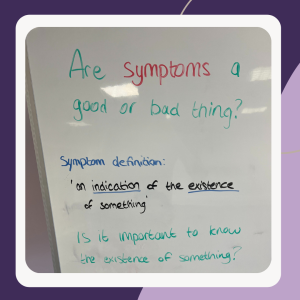
If you’ve ever felt a sharp, shooting pain that travels from your lower back down the back of your leg, you might have experienced sciatica. But what does that actually mean?
The Basics:
Sciatica isn’t a condition on its own – it’s a way of describing symptoms caused by irritation or pressure on the sciatic nerve. This is the longest nerve in your body, running from your lower spine, through your buttock and down the back of each leg.
What does Sciatica feel like?
People often describe sciatica pain as:
- Sharp, burning or shooting pain down the back of the leg
- Tingling or pins/needles
- Numbness
- Weakness in the leg or foot.
Pain can range from mild to severe and may get worse when sitting, coughing or sneezing.
Common Causes:
Sciatica usually happens when something compresses or irritates the sciatc nerve, such as:
- A herniated (slipped) disc,
- Spinal stenosis (narrowing of the spine)
- Muscle tightness (like the piriformis muscle)
- Injury to the lower back
Who gets it?
Sciatica is quite common, especially in adults between the ages of 30-50. Risk factors include sitting for long periods or heavy lifting.
How Chiropractic care can help:
Chiropractic care is one of the non-surgical options often used to help manage sciatica. Chiropractors adjust your spine to improve movement, reduce nerve irritation and support healing.
Recent evidence shows that adjustments may provide relief for pain and improved function in people with sciatica. For example:
- A randomized controlled trial found chiropractic care was more effective than sham treatment (fake care) for reducing sciatica pain over six months.
- Observational research suggests patients who start care with chiropractic may have a lower risk of opioid-related complications later on.
- Guidelines such as those from NICE (UK) recommend manual therapy – including chiropractic care, as part of a package of care alongside exercise
If you’re experiencing sciatica symptoms, its always best to check with a health care provider (your chiropractor or GP) especially if you pain is severe, lasts longer than a few weeks, or comes with weakness.
If you notice a loss of bladder or bowel control, please seek emergency help immediately – calling 999 or having someone drive you to A and E.
